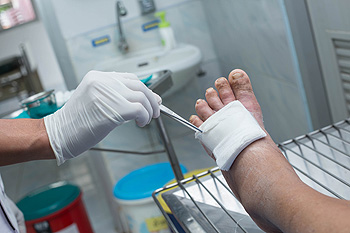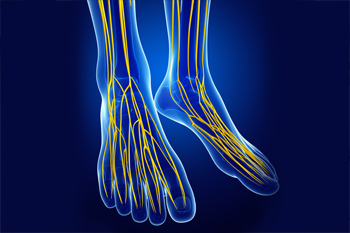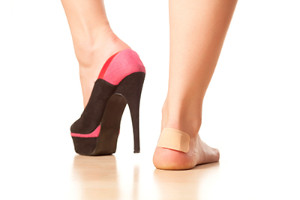Connect With Us
Blog
Items filtered by date: February 2022
What Causes Nerve Damage in the Feet?
Peripheral neuropathy, a type of nerve damage that affects the extremities, is a complication associated with several diseases. One of the most common types of neuropathy is diabetic neuropathy. As its name suggests, this type of nerve damage occurs in people who have diabetes. Approximately 25% of diabetics have experienced pain caused by nerve damage. Other potential causes of peripheral neuropathy include vitamin deficiencies, alcohol abuse, foot injuries, hypothyroidism, kidney disease, Charcot-Marie-Tooth disease, and certain infections. Since neuropathy in the feet can cause a reduction or loss of sensation, the feet are at an increased risk of developing wounds, which may become infected. If you have peripheral neuropathy, it is suggested that you be under the care of a podiatrist.
Neuropathy
Neuropathy can be a potentially serious condition, especially if it is left undiagnosed. If you have any concerns that you may be experiencing nerve loss in your feet, consult with Dr. Eddy Caldwell from Foot Care of Northeast Arkansas, P.A.. Our doctor will assess your condition and provide you with quality foot and ankle treatment for neuropathy.
What Is Neuropathy?
Neuropathy is a condition that leads to damage to the nerves in the body. Peripheral neuropathy, or neuropathy that affects your peripheral nervous system, usually occurs in the feet. Neuropathy can be triggered by a number of different causes. Such causes include diabetes, infections, cancers, disorders, and toxic substances.
Symptoms of Neuropathy Include:
- Numbness
- Sensation loss
- Prickling and tingling sensations
- Throbbing, freezing, burning pains
- Muscle weakness
Those with diabetes are at serious risk due to being unable to feel an ulcer on their feet. Diabetics usually also suffer from poor blood circulation. This can lead to the wound not healing, infections occurring, and the limb may have to be amputated.
Treatment
To treat neuropathy in the foot, podiatrists will first diagnose the cause of the neuropathy. Figuring out the underlying cause of the neuropathy will allow the podiatrist to prescribe the best treatment, whether it be caused by diabetes, toxic substance exposure, infection, etc. If the nerve has not died, then it’s possible that sensation may be able to return to the foot.
Pain medication may be issued for pain. Electrical nerve stimulation can be used to stimulate nerves. If the neuropathy is caused from pressure on the nerves, then surgery may be necessary.
If you have any questions, please feel free to contact our office located in Jonesboro, AR . We offer the newest diagnostic and treatment technologies for all your foot care needs.
Heel Pain in the Morning?
Kidney Health and Foot Ulcers
 It may seem strange to mention kidneys and feet in the same sentence, but the health of your kidneys can actually impact your foot health. When someone is afflicted with kidney disease, all systems in the body can suffer. This includes the circulatory system, which is responsible for transporting blood throughout the body, and the nervous system, which sends and receives messages between various parts of the body and the brain. People with kidney disease often have poor circulation in their lower limbs and nerve damage along the nerves that supply the feet. This results in an increased likelihood of developing foot ulcers, which are poorly healing wounds on the feet that can become infected. If you have kidney disease, a podiatrist can help you manage the health of your feet to prevent any foot-related complications.
It may seem strange to mention kidneys and feet in the same sentence, but the health of your kidneys can actually impact your foot health. When someone is afflicted with kidney disease, all systems in the body can suffer. This includes the circulatory system, which is responsible for transporting blood throughout the body, and the nervous system, which sends and receives messages between various parts of the body and the brain. People with kidney disease often have poor circulation in their lower limbs and nerve damage along the nerves that supply the feet. This results in an increased likelihood of developing foot ulcers, which are poorly healing wounds on the feet that can become infected. If you have kidney disease, a podiatrist can help you manage the health of your feet to prevent any foot-related complications.
When dealing with systemic disease of the feet, it is extremely important to check the affected areas routinely so that any additional problems are caught quickly. If you have any concerns about your feet and ankles contact Dr. Eddy Caldwell from Foot Care of Northeast Arkansas, P.A.. Our doctor will assist you with all of your podiatric needs.
Systemic Diseases of the Feet
Systemic diseases affect the whole body, and symptoms usually are displayed in the feet. This condition can make a patient’s ability to walk unbearable. Systemic diseases include gout, diabetes mellitus, neurological disorders, and arthritis.
Gout – is caused by an excess of uric acid in the body. Common symptoms include pain, inflammation, and redness at the metatarsal/phalangeal joint of the base big toe. Gout can be treated by NSAIDs to relieve pain and inflammation, and other drugs that lower the acid levels in the body.
Diabetes mellitus – is an increase in the level of blood sugar that the body cannot counteract with its own insulin. Failure to produce enough insulin is a factor in Diabetes.
Diabetes of the Feet
Diabetic Neuropathy – may lead to damaged nerves and affect the feet through numbness and loss of sensation.
Peripheral Vascular Disease – can restrict the blood flow to the feet, and often times lead to amputation of the feet.
If you have any questions please feel free to contact our office located in Jonesboro, AR . We offer the newest diagnostic and treatment technologies for all your foot and ankle needs.
Rheumatoid Arthritis May Be Causing Your Ankle Pain
 Ankle pain can sometimes be caused by rheumatoid arthritis (RA). This autoimmune disease which attacks healthy tissue can often start in the joints of the feet and ankles. When RA attacks the lining in the ankle joint, it becomes inflamed and damaged, along with ligaments and cartilage surrounding the joint. Over time, this deterioration weakens the bones of the ankle, causing them to rub together. This can cause pain in the ankle (which worsens as the disease progresses), stiffness, inflammation, difficulty standing, tenderness, redness and warmth, lack of balance, and more. People with RA in their ankles may also develop corns and bunions, hammertoes, bursitis, pain in the ball of their foot, a collapsed arch, and the shape of their foot may change. Symptoms outside of the feet include a loss of appetite and weight, low grade fever, fatigue, and weakness in the muscles. Genetics, obesity, and smoking can increase your risk of getting RA. If you are experiencing ankle pain, make an appointment with a podiatrist as soon as possible. Along with a physical examination and review of your medical history, your podiatrist may need blood tests, X-rays, ultrasounds, and MRIs to properly diagnose RA and begin a course of treatment to slow its progression and help manage its symptoms.
Ankle pain can sometimes be caused by rheumatoid arthritis (RA). This autoimmune disease which attacks healthy tissue can often start in the joints of the feet and ankles. When RA attacks the lining in the ankle joint, it becomes inflamed and damaged, along with ligaments and cartilage surrounding the joint. Over time, this deterioration weakens the bones of the ankle, causing them to rub together. This can cause pain in the ankle (which worsens as the disease progresses), stiffness, inflammation, difficulty standing, tenderness, redness and warmth, lack of balance, and more. People with RA in their ankles may also develop corns and bunions, hammertoes, bursitis, pain in the ball of their foot, a collapsed arch, and the shape of their foot may change. Symptoms outside of the feet include a loss of appetite and weight, low grade fever, fatigue, and weakness in the muscles. Genetics, obesity, and smoking can increase your risk of getting RA. If you are experiencing ankle pain, make an appointment with a podiatrist as soon as possible. Along with a physical examination and review of your medical history, your podiatrist may need blood tests, X-rays, ultrasounds, and MRIs to properly diagnose RA and begin a course of treatment to slow its progression and help manage its symptoms.
Because RA affects more than just your joints, including the joints in your feet and ankles, it is important to seek early diagnosis from your podiatrist if you feel like the pain in your feet might be caused by RA. For more information, contact Dr. Eddy Caldwell of Foot Care of Northeast Arkansas, P.A.. Our doctor will assist you with all of your podiatric concerns.
What Is Rheumatoid Arthritis?
Rheumatoid Arthritis (RA) is an autoimmune disorder in which the body’s own immune system attacks the membranes surrounding the joints. Inflammation of the lining and eventually the destruction of the joint’s cartilage and bone occur, causing severe pain and immobility.
Rheumatoid Arthritis of the Feet
Although RA usually attacks multiple bones and joints throughout the entire body, almost 90 percent of cases result in pain in the foot or ankle area.
Symptoms
- Swelling and pain in the feet
- Stiffness in the feet
- Pain on the ball or sole of feet
- Joint shift and deformation
Diagnosis
Quick diagnosis of RA in the feet is important so that the podiatrist can treat the area effectively. Your doctor will ask you about your medical history, occupation, and lifestyle to determine the origin of the condition. Rheumatoid Factor tests help to determine if someone is affected by the disease.
If you have any questions please feel free to contact our office located in Jonesboro, AR . We offer the newest diagnostic and treatment technologies for all your foot and ankle needs.
Giving the Boot to Foot and Ankle Injuries in Women
In the ice, snow, and cold of winter, women frequently will wear boots rather than shoes. But some boots may be more dangerous than others. Boots with high or spiked heels and pointy toes may put the wearer more at risk on slippery surfaces. If your ankle rolls inward or outward, it could result in a fracture. Twisting your ankle can cause a sprain – a torn or stretched ligament. To avoid winter foot injuries, try low-heeled boots with traction soles, and avoid wearing high-heeled shoes outdoors. If you have fallen and hurt your foot or ankle, it is a good idea to make an appointment with a podiatrist who can examine the injured area and recommend options for treatment.
High heels have a history of causing foot and ankle problems. If you have any concerns about your feet or ankles, contact Dr. Eddy Caldwell from Foot Care of Northeast Arkansas, P.A.. Our doctor can provide the care you need to keep you pain-free and on your feet.
Effects of High Heels on the Feet
High heels are popular shoes among women because of their many styles and societal appeal. Despite this, high heels can still cause many health problems if worn too frequently.
Which Parts of My Body Will Be Affected by High Heels?
- Ankle Joints
- Achilles Tendon – May shorten and stiffen with prolonged wear
- Balls of the Feet
- Knees – Heels cause the knees to bend constantly, creating stress on them
- Back – They decrease the spine’s ability to absorb shock, which may lead to back pain. The vertebrae of the lower back may compress.
What Kinds of Foot Problems Can Develop from Wearing High Heels?
- Corns
- Calluses
- Hammertoe
- Bunions
- Morton’s Neuroma
- Plantar Fasciitis
How Can I Still Wear High Heels and Maintain Foot Health?
If you want to wear high heeled shoes, make sure that you are not wearing them every day, as this will help prevent long term physical problems. Try wearing thicker heels as opposed to stilettos to distribute weight more evenly across the feet. Always make sure you are wearing the proper shoes for the right occasion, such as sneakers for exercising. If you walk to work, try carrying your heels with you and changing into them once you arrive at work. Adding inserts to your heels can help cushion your feet and absorb shock. Full foot inserts or metatarsal pads are available.
If you have any questions please feel free to contact our office located in Jonesboro, AR . We offer the newest diagnostic and treatment technologies for all your foot and ankle needs.








